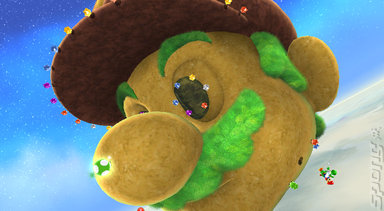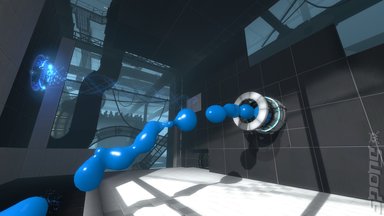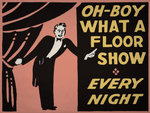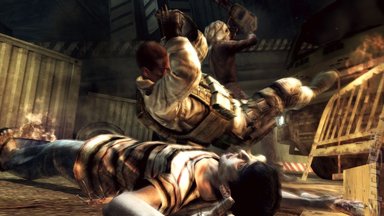Games:
Portal 2 Call of Duty: Black Ops Halo: Reach (Xbox 360) Super Mario Galaxy 2 (Wii) Alan Wake God of War III (PS3) Heavy Rain (PS3) Mass Effect 2 Half-Life 2 Final Fantasy XIII Bayonetta Red Dead Redemption
Letís take a look at some of the AAA titles that 2010 has, and will, bring us: Halo: Reach; God of War 3; Fable III; Call of Duty: Black Ops; Super Mario Galaxy 2; Final Fantasy XIII; Alan Wake;Heavy Rain; Mass Effect 2; Bayonetta; and Red Dead Redemption.
Notice a pattern?
All of these games, with the exception of Alan Wake, Heavy Rain and Bayonetta, belong to a franchise.
Thatís what you get nowadays, isnít it? Most new intellectual properties (IPs) in gaming are earmarked as trilogies before the first game hits the shops. You donít just get a new title, you get a whole 'franchise', complete with action figures, t-shirts, condoms, and comics (sorry, Ďgraphic novelsí) to fill you in on any obscure lore that youíll need to understand the inevitable movie.
Then, maybe Iím being too harsh on this endless stream of sequels. ĎIf it ainít broke, donít fix it.í Right? Right?
No. Wrong.
Franchises stubbornly cling to the gaming industryís collective arse-hair. All too often, they encourage complacency and cynicism amongst publishers. Game designers are forced by their superiors to make games that are Ďjust like the last one, but a tiny bit betterí. Originality gets pushed to the side in favour of the dry and cracked teat on the cash cowís udder.
Usually at this point, most video game hacks would carry on their tirade against franchises. Iím not going to do that. Instead, Iím going to look at why franchises have become the rule, and what we can do to remedy this.
Sequel Rights!
Sequels are safer bets. Usually (but not always) with a sequel, the previous gameís sales serve as a good indicator of how the new game will sell. Then, developers arenít flying blind; they can use the criticisms surrounding the last game in order to make a new and better product. They also have a following that the previous game has built up, and this will guarantee some attention for the new game. You just have to look at how Call of Duty has risen to near omnipotence over the last few years to see what I mean. I promise you that weíre not far away from seeing the armed forces use CoD branded weaponry.
Time is money, and for that reason franchises also make financial sense. When developers make a sequel, they donít have to spend time crafting a completely new game. They have already invested money in fleshing out characters and settings, and it will take fewer resources to build upon these as opposed to starting from scratch. As they already have a game engine that they can tweak to suit the sequelís needs, they donít need to waste time creating a new one. Face it: if you could have got through school by handing in the same essay time and time again, with a few tweaks here and there, youíd be tempted.
Don't be Daft
So, whatís causing this creative drought? Is it this recession that global news has lazily blamed for all of our problems recently? Have game developers become really thick? Has the internet permanently destroyed creative thought? Donít be daft.
Hereís a factual nugget for all you doom-mongers and naysayers: gaming has had franchises for almost as long as itís existed, itís not a recent phenomenon. A cursory look at the Pac-Man series reveals a number of cynical rehashes that nobody would stand for today. Not only were we given Pac Man, we were also given Ms. Pac-Man, Professor Pac-Man, Baby Pac Man, and Derek: Pac-Manís Neighbour, among others.
Then letís look at a few of the other franchises of yesteryear, some of which still churn out hits today: Tetris; Donkey Kong; Zelda; Sonic the Hedgehog; Final Fantasy; Alex Kidd; and Super Mario. The list goes on and thatís without mentioning the ongoing sports franchises.
Franchises arenít just unique to gaming, either. Cinema has innumerable franchises, each with its highs, lows, and eventual reboots. Look at Godzilla, for goodness' sake. Olí radioactive scales has been through so many iterations that itís even had to face Ferris Bueller in battle.
Even the literary world isnít above a good franchise. Sir Arthur Conan Doyle's publishers at Strand Magazine flogged the Sherlock Holmes horse until it wasnít even fit to be sent to the knacker's yard.
Therefore, regardless of the medium, youíre always going to get franchises in some form.
Fractal Franchises
Maybe because it's a younger medium, gaming seems to suffer from a greater degree of franchise-itis, however. As time goes on, we are seeing the emergence of what I like to call ĎFractal Franchisesí. These are franchises that have grown out of franchises, forming distinct but similar branches:
Call of Duty: Modern Warfare 2 and Super Mario Galaxy 2 are just two of these. I canít knock these games for their quality, but isnít it a depressing state of affairs when some of the most popular games franchises have grown out of other franchises, like a tumour on a tumour? Weíre going to be seeing a lot more Fractal Franchises if gaming sticks to the status quo.
This is where you lovely folks come in. Itís all well and good me blaming the evil games publishers for stifling originality, but we all have to take our share of the blame. Itís easy to feel comfortable with a franchise; we know exactly what weíre getting. But how often do we take the plunge and try something new? Weíre the ones that have allowed these franchises to dominate gaming, and it makes sense for the publishers to keep pandering to this.
Yes, all right, every now and again strikingly original games such as Portal come along to great fanfare. But for every one of those, how many others get left by the wayside? For every Portal, there is a Rez: a truly original game that met with glowing reviews, but only achieved lacklustre sales1. It must be discouraging for game developers who do create something original and are met with apathy.
Rewards
As gamers with spending power, we need to reward originality and shun unnecessary sequels. To an extent, this is already happening. Look at Bioshock 2. Six months after its release, it had plummeted to £8.99. Why is this? Bioshock didnít need a sequel.
Bioshock was an excellent standalone game, and by the end the story of Rapture felt complete. Like a coal miner asked to deliver a eulogy for Margaret Thatcher, Bioshock 2 had nothing to contribute.
Itís a shame, for in many respects Bioshock 2 greatly improves upon its predecessor. 2K Marin made an admirable effort in expanding Raptureís story, but it was unnecessary. Just imagine what could have been achieved were they allowed to make a new game in their own image, instead of being forced to work towards another teamís artistic vision.
Half-Life
Franchises are always going to exist in gaming, and theyíre not all bad. Iím not going to be unrealistic and say that all franchises should be murdered in their sleep. Some truly excellent ideas have come from games that are part of a franchise. Where would we be, for instance, without Mario 64ís masterful example of how analogue controls can be used in gaming?
However, for every Mario 64, we have a Resident Evil 5; a stale game that added little to the series, except for some chronic screen-tear and borderline racism.
Developers should be allowed to unleash the full extent of their creativity more often, as opposed to letting their ideas slowly trickle into franchises over the years. As a result, video games would inevitably become a much more fun and enriching experience for all involved.
Except for you, Valve. Youíre not allowed to have any new ideas until you stop doing an Axl Rose and give us Half Life 2: Episode 3. Seriously. Just stop it.
Note: 1 Seriously, if you havenít already played it, get yourself a good set of headphones and download it from XBLA Ė because it's still not on PSN.
Notice a pattern?
All of these games, with the exception of Alan Wake, Heavy Rain and Bayonetta, belong to a franchise.
Thatís what you get nowadays, isnít it? Most new intellectual properties (IPs) in gaming are earmarked as trilogies before the first game hits the shops. You donít just get a new title, you get a whole 'franchise', complete with action figures, t-shirts, condoms, and comics (sorry, Ďgraphic novelsí) to fill you in on any obscure lore that youíll need to understand the inevitable movie.
Then, maybe Iím being too harsh on this endless stream of sequels. ĎIf it ainít broke, donít fix it.í Right? Right?
No. Wrong.
Franchises stubbornly cling to the gaming industryís collective arse-hair. All too often, they encourage complacency and cynicism amongst publishers. Game designers are forced by their superiors to make games that are Ďjust like the last one, but a tiny bit betterí. Originality gets pushed to the side in favour of the dry and cracked teat on the cash cowís udder.
Usually at this point, most video game hacks would carry on their tirade against franchises. Iím not going to do that. Instead, Iím going to look at why franchises have become the rule, and what we can do to remedy this.
Sequel Rights!
Sequels are safer bets. Usually (but not always) with a sequel, the previous gameís sales serve as a good indicator of how the new game will sell. Then, developers arenít flying blind; they can use the criticisms surrounding the last game in order to make a new and better product. They also have a following that the previous game has built up, and this will guarantee some attention for the new game. You just have to look at how Call of Duty has risen to near omnipotence over the last few years to see what I mean. I promise you that weíre not far away from seeing the armed forces use CoD branded weaponry.
Time is money, and for that reason franchises also make financial sense. When developers make a sequel, they donít have to spend time crafting a completely new game. They have already invested money in fleshing out characters and settings, and it will take fewer resources to build upon these as opposed to starting from scratch. As they already have a game engine that they can tweak to suit the sequelís needs, they donít need to waste time creating a new one. Face it: if you could have got through school by handing in the same essay time and time again, with a few tweaks here and there, youíd be tempted.
Don't be Daft
So, whatís causing this creative drought? Is it this recession that global news has lazily blamed for all of our problems recently? Have game developers become really thick? Has the internet permanently destroyed creative thought? Donít be daft.
Hereís a factual nugget for all you doom-mongers and naysayers: gaming has had franchises for almost as long as itís existed, itís not a recent phenomenon. A cursory look at the Pac-Man series reveals a number of cynical rehashes that nobody would stand for today. Not only were we given Pac Man, we were also given Ms. Pac-Man, Professor Pac-Man, Baby Pac Man, and Derek: Pac-Manís Neighbour, among others.
Then letís look at a few of the other franchises of yesteryear, some of which still churn out hits today: Tetris; Donkey Kong; Zelda; Sonic the Hedgehog; Final Fantasy; Alex Kidd; and Super Mario. The list goes on and thatís without mentioning the ongoing sports franchises.
Franchises arenít just unique to gaming, either. Cinema has innumerable franchises, each with its highs, lows, and eventual reboots. Look at Godzilla, for goodness' sake. Olí radioactive scales has been through so many iterations that itís even had to face Ferris Bueller in battle.
Even the literary world isnít above a good franchise. Sir Arthur Conan Doyle's publishers at Strand Magazine flogged the Sherlock Holmes horse until it wasnít even fit to be sent to the knacker's yard.
Therefore, regardless of the medium, youíre always going to get franchises in some form.
Fractal Franchises
Maybe because it's a younger medium, gaming seems to suffer from a greater degree of franchise-itis, however. As time goes on, we are seeing the emergence of what I like to call ĎFractal Franchisesí. These are franchises that have grown out of franchises, forming distinct but similar branches:
Call of Duty: Modern Warfare 2 and Super Mario Galaxy 2 are just two of these. I canít knock these games for their quality, but isnít it a depressing state of affairs when some of the most popular games franchises have grown out of other franchises, like a tumour on a tumour? Weíre going to be seeing a lot more Fractal Franchises if gaming sticks to the status quo.
This is where you lovely folks come in. Itís all well and good me blaming the evil games publishers for stifling originality, but we all have to take our share of the blame. Itís easy to feel comfortable with a franchise; we know exactly what weíre getting. But how often do we take the plunge and try something new? Weíre the ones that have allowed these franchises to dominate gaming, and it makes sense for the publishers to keep pandering to this.
Yes, all right, every now and again strikingly original games such as Portal come along to great fanfare. But for every one of those, how many others get left by the wayside? For every Portal, there is a Rez: a truly original game that met with glowing reviews, but only achieved lacklustre sales1. It must be discouraging for game developers who do create something original and are met with apathy.
Rewards
As gamers with spending power, we need to reward originality and shun unnecessary sequels. To an extent, this is already happening. Look at Bioshock 2. Six months after its release, it had plummeted to £8.99. Why is this? Bioshock didnít need a sequel.
Bioshock was an excellent standalone game, and by the end the story of Rapture felt complete. Like a coal miner asked to deliver a eulogy for Margaret Thatcher, Bioshock 2 had nothing to contribute.
Itís a shame, for in many respects Bioshock 2 greatly improves upon its predecessor. 2K Marin made an admirable effort in expanding Raptureís story, but it was unnecessary. Just imagine what could have been achieved were they allowed to make a new game in their own image, instead of being forced to work towards another teamís artistic vision.
Half-Life
Franchises are always going to exist in gaming, and theyíre not all bad. Iím not going to be unrealistic and say that all franchises should be murdered in their sleep. Some truly excellent ideas have come from games that are part of a franchise. Where would we be, for instance, without Mario 64ís masterful example of how analogue controls can be used in gaming?
However, for every Mario 64, we have a Resident Evil 5; a stale game that added little to the series, except for some chronic screen-tear and borderline racism.
Developers should be allowed to unleash the full extent of their creativity more often, as opposed to letting their ideas slowly trickle into franchises over the years. As a result, video games would inevitably become a much more fun and enriching experience for all involved.
Except for you, Valve. Youíre not allowed to have any new ideas until you stop doing an Axl Rose and give us Half Life 2: Episode 3. Seriously. Just stop it.
Note: 1 Seriously, if you havenít already played it, get yourself a good set of headphones and download it from XBLA Ė because it's still not on PSN.
The opinion expressed in this article is that of the author and does not reflect those of SPOnG.com except when it does.
Want to vent your gaming spleen? Send 900 words max of well thought-out, deeply analysed opinion and we may even run it. Send in 900 words of incisive but mostly brutally angry invective, and we almost certainly will.
Games:
Portal 2 Call of Duty: Black Ops Halo: Reach (Xbox 360) Super Mario Galaxy 2 (Wii) Alan Wake God of War III (PS3) Heavy Rain (PS3) Mass Effect 2 Half-Life 2 Final Fantasy XIII Bayonetta Red Dead Redemption
Read More Like This
Comments
Franchises or game series are a mixed bunch, on the one hand you get the "ever improving" God of War series, or the "miles better than the original" Assassin's Creed 2. On the other hand you get the "declining with speed bumps" Tomb Raider series or the "flogged to death" Need for Speed set of games.
However, without sequels we wouldn't have got AC2 just like we haven't got a follow up to Mirror's Edge, a game with so much promise that wasn't fully delivered on. There are a few games I've played that didn't quite make it which would benefit from a sequel, or six months more dev time, to make them truly great.
Sequels can allow developers to refine their ideas and include the full picture of the original concept.
Or you can churn out a yearly iteration of the same old game.
However, without sequels we wouldn't have got AC2 just like we haven't got a follow up to Mirror's Edge, a game with so much promise that wasn't fully delivered on. There are a few games I've played that didn't quite make it which would benefit from a sequel, or six months more dev time, to make them truly great.
Sequels can allow developers to refine their ideas and include the full picture of the original concept.
Or you can churn out a yearly iteration of the same old game.
Yeah, I do think the key is what differences warrant the sequel, based on the individual game. You get FIFA, which is very gradual change in gameplay, but the stats change; some sequels are drastic changes; and some are just another episode in the story.
I would like to see rarer sequels, and larger/more frequent downloadable content, if the game isn't really going to change yet.
Still, the important thing, I think, is variety. Not just across "franchises", but between sequels - and also variety between "franchises's" sequels can't be that bad a consquence. Anyhow, I suppose it's all just one big lesson in how to make better games... (Even if it takes a long time to learn :P)
I would like to see rarer sequels, and larger/more frequent downloadable content, if the game isn't really going to change yet.
Still, the important thing, I think, is variety. Not just across "franchises", but between sequels - and also variety between "franchises's" sequels can't be that bad a consquence. Anyhow, I suppose it's all just one big lesson in how to make better games... (Even if it takes a long time to learn :P)
@tyrion You make some great points, some of which I would have liked to have expanded on in my article. Unfortunately if I'd done that, then the piece would have been well over 3000 words.
It is a shame that Mirrors Edge wasn't given another try. As much as I got infuriated with the game and the hundreds of retries towards the end, getting it just right was exhilarating. (Plus I quite enjoyed listening to Metallica's 'For Whom the Bell Tolls' on sections where I kept dying repeatedly. Oh I am droll...)
It just rubs salt into the wounds when utter dogs of games like Kane & Lynch and Army of Two are given sequels just because the publishers put so much money into creating and publicising their new IPs, and they want to recoup their losses.
Liam
It is a shame that Mirrors Edge wasn't given another try. As much as I got infuriated with the game and the hundreds of retries towards the end, getting it just right was exhilarating. (Plus I quite enjoyed listening to Metallica's 'For Whom the Bell Tolls' on sections where I kept dying repeatedly. Oh I am droll...)
It just rubs salt into the wounds when utter dogs of games like Kane & Lynch and Army of Two are given sequels just because the publishers put so much money into creating and publicising their new IPs, and they want to recoup their losses.
Liam









